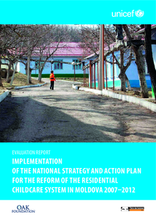In 2007 the Government of Moldova approved the National Strategy and Action Plan for the Reform of the Residential Childcare System 2007-2012. The overall objectives of the Action Plan were to reduce the number of children living outside a family by 50% and to reorganise residential institutions to support children in families. This informative evaluation commissioned by UNICEF, the Government of the Republic of Moldova and NGO partners is built around 6 critical questions:
- Assessing relevance: To what extent did implementation of the National Strategy and Action Plan respond to the priorities in overall social and child protection reforms?
- Assessing effectiveness: To what extent did the implementation of the reform of the residential childcare system meet the outcomes as defined by the National Strategy and Action Plan?
- Assessing efficiency: To what extent did the management of the implementation of the reform of the residential childcare system ensure defined timelines were kept to?
- Assessing impact: To what extent and in what way did the implementation of the reform of the residential childcare system succeed in improving the situation of children, especially the poor, vulnerable and marginalised ones?
- Assessing sustainability: To what extent are the outcomes achieved sustainable?
- Assessing human rights approach: To what extent do the project outcomes contribute to the achievement of children’s rights and to what extent have they contributed to addressing key cross-cutting issues?
It concludes that implementation of the strategy has contributed to a considerable reduction in number of children in institutions in Moldova, by 54% by the beginning of June 2012 from 2007 levels. Furthermore, the specific objectives of the Action Plan were judged to be realistic overall, though the evaluators concluded it was probably too ambitious to plan that all children and families in Moldova could have access to quality family-type and community-based social services by 2012. At the same time, excellent examples of local public authorities (LPAs) and NGOs processes and services to support children in families were identified in some areas, including training and support for foster carers, supported living accommodation for children in disabilities, Mother and Baby shelters, and participatory processes to involve children in the development of community based services.
The evaluation also identified some shortcomings and unexpected findings. It points to the fact that a majority of children deinstitutionalized have come from boarding and auxiliary boarding schools under the Ministry of Education rather than special institutions for children with disabilities or young children under the Ministry of Labour, Social Protection and Family and the Ministry of Health. Despite the impressive reduction in the number of children, the combined number of institutions under the different Ministries had only reduced from 67 to 57 during that period. The author concludes that there still appears to be a large capacity for institutionalisation in Moldova. The evaluation also highlighted the slow development of foster care services, with the majority of children deinstitutionalized being those able to return to their families, while placements for those needing foster families were very limited, thought to be about 270 or less. It also found that efforts to redirect financial resources from the residential system to community-based and family-type services had not been achieved at the time of the assessment. Instead, savings arising from the reduction of children in residential institutions of the Ministry of Education had been re-absorbed into expenditures associated with the remaining institutions. The evaluation also questions whether NGO activities would continue at the same level, if funding by international donors were to be redirected elsewhere. It urges the central government to assume a more active role to support less active regional administrations to contract the supply of prevention and deinstitutionalization services from the local NGOs.
©UNICEF, Oak Foundation and Terre des Hommes Moldova

